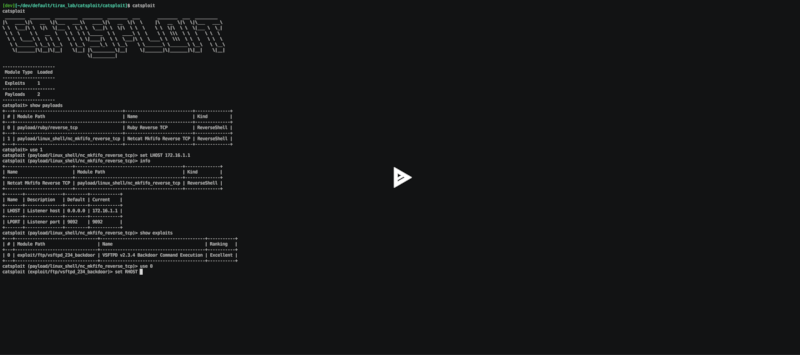2 releases
| 0.1.2 | Mar 2, 2023 |
|---|---|
| 0.1.0 | Mar 2, 2023 |
#1055 in Testing
68KB
1.5K
SLoC
Catsploit
Catsploit is an open-source modern exploitation framework inspired by Metasploit.
Catsploit is currently in early development and the project is aiming to attract contributors who are interested in building the next generation exploitation framework in Rust. The project is intended to stay 100% open-source with no premium version, and is licensed under GPLv3.
Install
To install as a crate: cargo install catsploit
To build from source:
git clone https://github.com/tirax-lab/catsploit
cd catsploit/catsploit
cargo build --release
sudo cp ./target/release/catsploit /usr/local/bin
Example Usage - Exploiting the VSFTPD v2.3.4 Backdoor
In this exploitation a virtual machine with Metasploitable2 is running at 172.16.187.128, which has a vulnerable VSFTPD server running:
- The default reverse shell
nc_mkfifo_reverse_tcppayload has itsLHOSTset to172.16.1.1which is where VMware routes back to the host machine - The
VSFTPDexploit has itsRHOSTset to172.16.187.128and the defaultRPORTis21for the FTP server - When
runis called, the exploit runs and the payload runs a pretask which starts a listening TCP server for the shell connection - The exploit is successful and the payload executes on the Metasploitable2 system, the listening TCP server receives a connection and a root shell is opened
Contributing
TODO
- Module Types, catsploit currently has exploit and payload module types defined. Auxiliary, Evasion, Encoder, and many other module types should be created
- More modules, more exploits, payloads and others written so that catsploit becomes usable in a general pentest
- Better documentation for new users, tutorials, videos, etc.
Code Structure
- The
catsploitdirectory contains only the code to create the CLI app, such as the user input loop and dealing with setting module options.catsploitinteracts with thecatsploit_liblibrary - The
catsploit_libdirectory contains the library.catsploit_libcontains the functional code for carrying out tasks with Catsploit. For example theExploittrait and also the individual modules such as theVsftpd234Backdoorexploit
This structure of a split between the CLI app and the library allows other custom applications to hook into catsploit_lib and use its functionality. For example an axum server could be written in the future to allow calling of catsploit_lib code from a website.
Automated Testing
Some points on automated testing within Catsploit:
- Tests are written for logical functionality. For example in
catsploit_lib/src/core/exploit/remote_tcp.rs, tests are written for the bothconnectandcustom_connectbut not foropts. A test could be written foroptsthat iterates through the values looking forRHOSTetc., but this makes the changing theoptsfunction more involved for not much benefit - Tests are not written for functions that only print to STDOUT with no side effects. Example being
print_exploitincatsploit/src/cli/info.rs - It's fine to modify a functions parameters and code block solely to make it more testable. For example
show_exploitsincatsploit/src/cli/cmd/show.rstakes a boolean indicating if the function is running in a test or not, to prevent it from printing the full exploit table to STDOUT during tests. There may be possible ways to block the STDOUT printing in the tests using closures etc., that wouldn't need to modify theshow_exploitsfunction signature. The added complexity and development time for that isn't worth it to avoid a simple parameter change.
Running Tests
To run tests for both the catsploit library and the CLI application:
cargo test --manifest-path=catsploit_lib/Cargo.toml && cargo test --manifest-path=catsploit/Cargo.toml
Dependencies
~6–14MB
~153K SLoC
